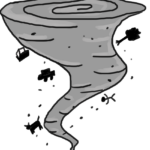I commend to you 11 U.S.C. 522(c).
For therein lies a magical tool even for the client who has non dischargeable debts.
It boils down to this: exemptions, like diamonds, are forever.
Once an exemption is allowed in a case that isn’t dismissed, that property is forever beyond the reach of creditors whose claim arose before filing.
The exceptions to the rule are narrow: non dischargeable taxes and support.
Exempt property, in the words of the court in Cunningham is immunized against non excepted creditors.
The statute
Subsection (c) of 522 reads:
c) Unless the case is dismissed, property exempted under this section is not liable during or after the case for any debt of the debtor that arose, or that is determined under section 502 of this title as if such debt had arisen, before the commencement of the case, except—
(1) a debt of a kind specified in paragraph (1) or (5) of section 523 (a) (in which case, notwithstanding any provision of applicable nonbankruptcy law to the contrary, such property shall be liable for a debt of a kind specified in such paragraph);
(2) a debt secured by a lien that is—
(A) (i) not avoided under subsection (f) or (g) of this section or under section 544, 545,547, 548, 549, or 724 (a) of this title; and
(ii) not void under section 506 (d) of this title; or
(B) a tax lien, notice of which is properly filed;….
The application of §522(c) to non dischargeable claims surprised me. Debts incurred by fraud, dishonesty or divorce (what a coupling!) may survive bankruptcy as personal liabilities, but cannot be enforced against property claimed exempt in a bankruptcy case.
Applying forever exemptions
The implications in a couple of my current cases are breathtaking. Each case involves a Chapter 7 with a substantial debt that is non dischargeable. One is a fraud claim; the other a non support debt grounded in a divorce.
The debtor’s claim of exemption in his home will bar either of those creditors from ever enforcing a judgment lien against the client’s home.
Right now, real estate values are low, and there is little or no equity in those homes. But the market here is improving and the debtors are dutifully making mortgage payments every month, creating equity payment by payment.
For so long as each client remains in the homes they have now, the creditors with claims that survive are limited in their collection avenues.
I expect, as well, that those creditors, armed with a bit of hubris, may attempt to record a lien against the property, making for an interesting question as to whether that lien is a violation of the discharge injunction, or is merely void as to a particular piece of property.
Even when a debt survives a bankruptcy case, it seems there is substantial, and underappreciated, benefit to the bankruptcy case and the claim of exemptions.
Image courtesy of Flickr and Ihave3kids.








